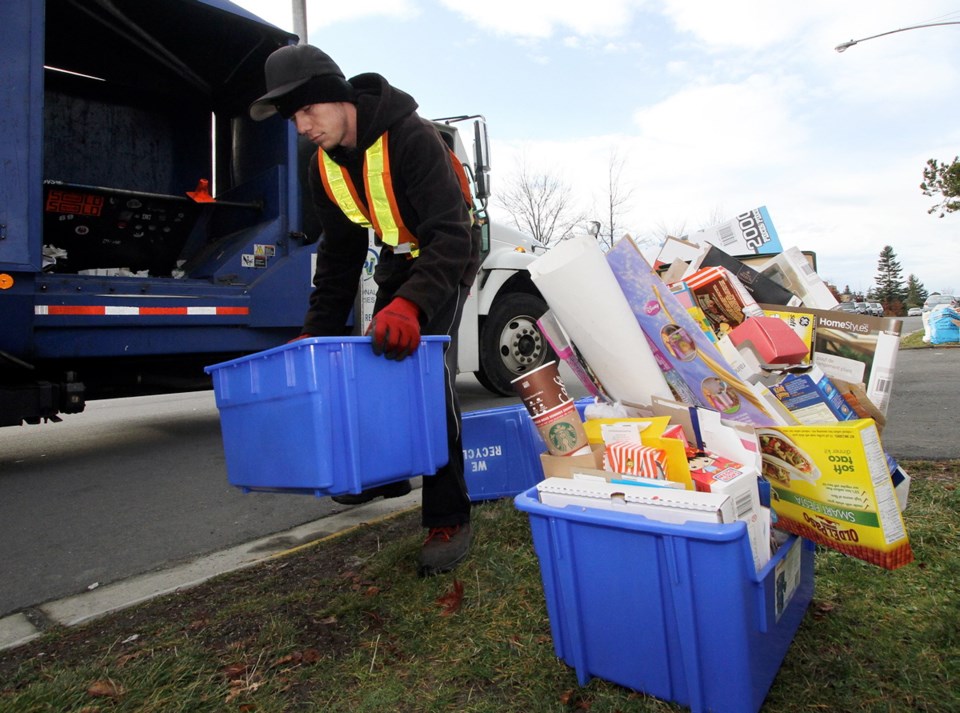Glass from many Greater Victoria condos, townhouses and apartment buildings — everything from wine bottles to jam and sauce jars — is no longer being collected for recycling.
And while some is making its way to collection depots for recycling, a portion is ending up in the dump — even though glass is a banned material.
“It’s not that we’re letting in huge truckloads of glass, but we’re trying to understand where that enforcement makes sense. Enforcing it without actually having a market for it to go to isn’t necessarily logical either,” said Russ Smith, senior manager of environmental resources for the Capital Regional District.
Discretion has to be used in enforcing the glass ban because there is no market for recycled glass, Smith said.
The CRD manages the residential blue-box recycling program for single family homes on behalf of the provincial organization Recycle B.C. But the CRD program does not cover multi-unit buildings such as condos, apartments and townhouses, which rely on private contractors to collect garbage and recyclables.
Glass is still collected from most single-family homes through the blue box program but, in recent months, haulers have notified many multi-family complexes that they will no longer collect glass for recycling.
“I think responsible haulers tend to say: ‘We don’t have a market for this stuff, so we’re not going to tell you we’re recycling it and then throw it in the garbage. We’re just going to stop collecting it as recyclables because we want to be transparent about the market conditions,’ ” Smith said.
Stew Young, owner of Alpine Disposal, said it doesn’t make economic sense to collect glass.
Glass is also problematic in that it breaks during collection and contaminates other materials, making them worthless.
Lyndsey Chauhan, director of marketing and communications with Recycle B.C. agrees that contamination of other materials is a problem with glass.
“When it breaks and is collected in the same container as other packaging or paper, shards of glass get embedded in and mixed with the other recyclables and cannot be separated again,” Chauhan said.
“This means that neither the glass, nor the other recyclables, can be recycled.”
Young believes the region should get glass out of curbside recycling altogether and instead deal with it through a combination of deposit and depot collection.
“If you put a deposit on it, then it’s source separated and people get money for it right off the bat.”
Frank Leonard, who was chair of the CRD’s environment committee when the blue box program was introduced in 1989, said the market for glass has always been marginal.
“Everybody was trying to come up with a desperate way to get rid of it but, symbolically, we thought it would be a blow to the blue box to take it out,” Leonard said.
Leonard said people were working hard to get materials out of the waste stream and telling them to put glass back into that waste stream could hurt the credibility of the recycling program and maybe even damage the culture of what had been established.
Traditionally, most glass collected has been ground up and used as construction aggregate. There was even a period when the CRD was paying haulers to collect glass through the blue-box program, then buying back the crushed glass to use as fill at the landfill.
Smith said the CRD will soon be soliciting views from the public about a host of issues on garbage and recycling, including how to best address issues such as glass collection.
A move to depots may be an option. Another effort could be to try to change peoples’ buying habits so they don’t buy glass containers in the first place.
“Maybe it’s about buying things not in glass now, understanding glass isn’t being recycled. Maybe it’s just understanding that, unfortunately, like in most regional districts, it’s something that people have to take to depots,” Smith said.
Leonard said he would still argue against pulling glass out of the blue box. He feels that eliminating glass in collections could lead to a situation where people might start thinking that recycling doesn’t matter, that you just put material in a landfill.
“You want a culture of recycling and reuse and composting and everything in every single house, in every single townhouse, in every single condo and every single business,” Leonard said.



